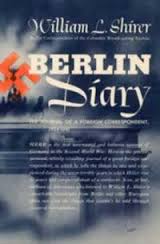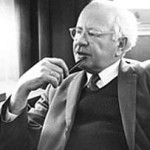By Elliott Brack, editor and publisher | Back in the winter of 1962, just after the publication of The Rise and Fall of the Third Reich, Iowa native William L. Shirer was scheduled to speak at the University of Iowa. His book chronicled the Nazi era by someone actually living in Europe, and watching and chronicling this bit of history.
 That night was one of those “dark and stormy nights,” with a heavy snow. But a big crowd made it on campus to hear Mr. Shirer at the appointed hour. However, he wasn’t there. The snowstorm had delayed him. We were told to sit tight, as he was trying to get there.
That night was one of those “dark and stormy nights,” with a heavy snow. But a big crowd made it on campus to hear Mr. Shirer at the appointed hour. However, he wasn’t there. The snowstorm had delayed him. We were told to sit tight, as he was trying to get there.
Then about 9 p.m. the author, relatively rumpled in somewhat disarray, arrived. He was delightful and entertaining, recounting his observations of the Nazi regime, especially in its build-up. Mr. Shirer had been a European newspaper correspondent, and later joined Ed Murrow of CBS News, in historic broadcasts from the Continent, something new for the media, as they reported each day what was taking place in Europe.
Shirer left Europe in December of 1940, then turned to writing his epic Berlin Diary, which gave Americans a massive detailed account of what was happening in Germany. He helped pave the way to our joining World War II. By then Adolf Hitler had over-run many of Europe’s countries. He had destroyed Warsaw in his swift annihilation of many Poles. The low countries and France had fallen, Italy and Japan were on the German side, Russia was an ally of Germany, and everyone was expecting Germany to invade Britain any day now.
Shirer gives day-by-day blows, giving insight into Hitler, the German people, and how all this quick military build-up took place.
Among some observations:
- Hitler invaded countries like Denmark and Norway to “protect” those countries from the Allies.
- The Third Reich absolutely controlled the media, with obvious lies daily. Example: after a Berlin air raid caused extensive damage in the city, the newspapers reported that all British bombers had failed to reach the city.
- The regime employed nationalism to arouse the people. For instance, at the massive Hitler rallies, the first part of all programs was always symphony orchestras playing music of Beethoven, Wagner and other German composers.
 Hitler in particular hated Churchill, and thought Britain would surrender to Germany.
Hitler in particular hated Churchill, and thought Britain would surrender to Germany.- The German people were led to believe that the British and French did not want peace, and were warmongers.
- Shirer, on a tour through France two weeks after that nation fell, observed that “the French did not fight,” putting up little opposition to the blitzkrieg.
Shirer did this reporting by close observation of the Germans and of Hitler in particular over six years. He recounts Hitler’s facial features, his method of walking, him becoming almost uncontrollable in his zealous speeches. He also tells us that Hitler was a “vegetarian, teetotaler and non-smoker,” not a garrulous person, not close to his main military figures, and had lunch with only a small circle of three or four adjutants.
William L. Shirer is the author of at least 18 books, mostly about the Third Reich, but also wrote a respected account of Gandhi.
His work is often relied upon for his scholarly accounts of Germany prior to and during World War II. He died in 1993 at age 89. Re-reading his personal account before America came into the war gives even more insight into how it all happened.












Follow Us